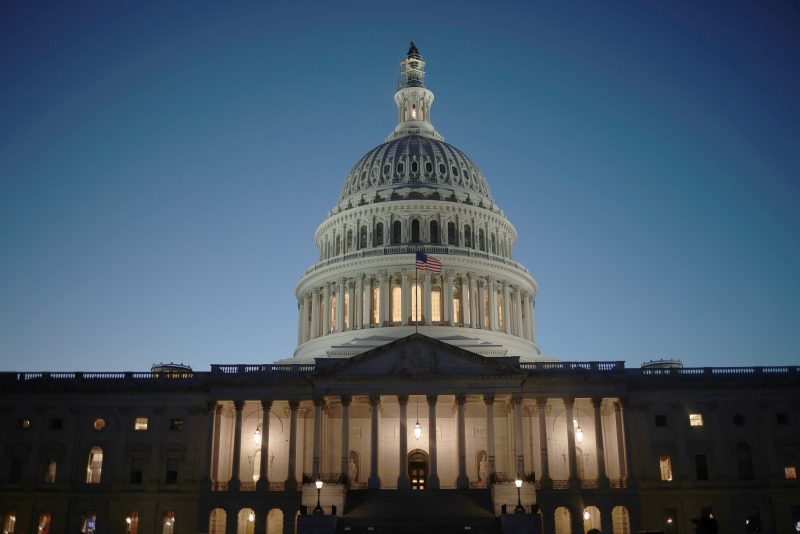The Senate on Wednesday passed the annual defense policy bill, delivering a rebuke to hard-right House conservatives who sought to infuse the legislation with a wish list of provisions to undo Pentagon policies encompassing abortion access, LGBTQ+ rights and diversity initiatives.
The $886 billion National Defense Authorization Act (NDAA) was approved by a vote of 87-13. The House is expected to follow suit Thursday, after which the bill will proceed to President Biden to be signed into law.
The 3,000-plus-page legislation, a product of months of negotiations, directs how federal dollars can be spent on defense-related programs and initiatives. It authorizes expanded military partnerships in the Indo-Pacific and in Europe — ongoing efforts aimed at countering China and Russia, respectively — and structural updates at bases and barracks. The legislation includes a pay raise for service members, the procurement of new weapons and missile-defense systems, and numerous other national security imperatives.
Notably, it also extends the Ukraine Security Assistance Initiative, the vehicle through which the Biden administration has helped support Ukraine’s ongoing war with Russia, through fiscal 2027. However, the bulk of any future Ukraine aid — part of Biden’s emergency national security funding request — remains mired in partisan battles and appears unlikely to pass Congress this year, if at all.
“At a time of huge trouble for global security, doing the defense authorization bill is more important than ever,” Senate Majority Leader Charles E. Schumer (D-N.Y.) said on the Senate floor Wednesday. “Passing the NDAA enables us to hold the line against Russia, stand firm against the Chinese Communist Party and ensure America’s defenses remain state-of-the-art at all times.”
Over the summer, the typically bipartisan NDAA became ground zero in the nation’s increasingly polarized culture wars, as hard-right Republicans leveraged the GOP’s fragile House majority to attach various provisions aimed at dismantling what they called the military’s “woke” policies on abortion, race and gender-affirming health care.
The subsequent passage of a substantially different bill by the Democratic-controlled Senate caused some congressional staff and analysts to worry that this year could mark the first time in decades that Congress might fail to reach a compromise on what’s long been deemed must-pass legislation.
But the compromise bill approved Wednesday is void of nearly all of the hard right’s culture-war provisions — including a measure that would have barred the Defense Department from reimbursing the travel costs of U.S. service members who travel out of state to obtain an abortion. That outcome has infuriated many on the far right who had been outspoken in their advocacy of imposing major changes on the Pentagon.
“The Swamp’s ‘compromise’ NDAA is woke, weaponized, and wrong for America,” Rep. Andrew S. Clyde (R-Ga.), a member of the House Freedom Caucus, wrote Wednesday on X, the social media site formerly known as Twitter.
Arguments over the abortion proposal, in particular, “played throughout the negotiations,” said one Republican Senate aide, speaking on the condition of anonymity to discuss the internal process. But House Republicans’ gamble, this person said, rendered that chamber’s NDAA a piece of legislation that “they knew … wouldn’t be able to pass the Senate,” giving significant negotiating leverage to the Democrats as both sides hashed out the final bill.
The House Armed Services Committee’s top Democrat, Rep. Adam Smith (Wash.), “had the most leverage,” the Republican Senate aide said. “Why? Because a subgroup of House Republicans signaled pretty early on: ‘We’re a hell no on everything.’”
Republicans had to fight “tooth and nail” even to retain a provision, initially proposed by the Biden administration, allowing the Defense Department to assist the Department of Homeland Security on the U.S.-Mexico border, the aide said.
The compromise NDAA does prohibit “the display of any unapproved flags, such as the LGBTQ Pride flag at military installations,” according to a summary of the bill released by the Republican leadership of the House Armed Services Committee. And it “reiterates” that no Defense Department money is to be spent on drag shows or other events involving drag queens, the summary says.
The bill also caps base pay for Defense Department employees whose positions are primarily related to initiatives aimed at fostering diversity, equity and inclusion (DEI) in the workforce.
“I’m fairly pleased that we are getting some credit from the conservative base about some victories,” Sen. Roger Wicker (Miss.), the ranking Republican on the Senate Armed Services Committee, told reporters Wednesday.
Wicker said his main complaint about the compromise bill was that the top line was ultimately too low for most Republicans’ liking. Defense spending, as laid out in the NDAA, accounts for roughly 3 percent of the U.S. gross domestic product. To effectively prepare for and counter the threats that the United States faces from China, Russia, Iran, North Korea and other adversaries, Wicker said, defense spending should be closer to 4 or 5 percent of GDP.
“The status quo,” he said, “is not going to get us to where we need to be.”
A few Senate Republicans, including Sen. Rand Paul (Ky.), objected to the inclusion of a four-month reauthorization of a controversial warrantless surveillance program that targets foreigners overseas. Critics say it intrudes on Americans’ privacy — when their electronic communications with foreigners are searched for by U.S. intelligence — while the government maintains that national security would be put at risk if it is allowed to lapse.
The temporary reauthorization of Section 702 of the Foreign Intelligence Surveillance Act, which is set to expire at the end of the year, drew last-minute attempts by Paul and others to rally constituents against its inclusion in the NDAA’s final passage.
The House was slated to consider separate bills on long-term Section 702 reauthorization this week and then canceled those votes.
Ellen Nakashima contributed to this report.

































